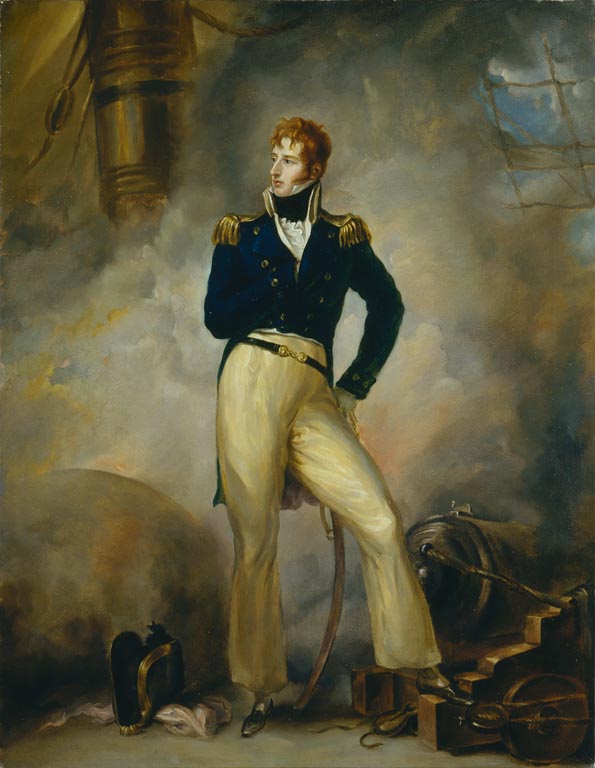Thomas Alexander Cochrane (1775-1860) was one of the most daring and successful naval captains of the Napoleonic Wars, and later led the navies of Chile, Brazil and Greece in their independence struggles. He was also, until pardoned, a convicted fraudster, an MP, industrialist and, like his father, inventor. He was the inspiration if not the model for C.S. Forrester’s hero Horatio Hornblower and Patrick O’Brien’s Jack Aubrey.
Katherine (“Kitty”) Frances Corbett Barnes (c. 1794-1865) was the sixteen-year-old daughter of a Spanish dancer and the niece of a stationer. She was said to be sweet-natured and compliant but she was also spirited and hardy – she and her children accompanied Cochrane on his foreign adventures. Eighteen or twenty years separated them but they seem to have been a good match and remained, on the whole, faithful to each other.
After attending school in Great Marlow, Buckinghamshire Kitty was living with her widowed aunt at 9 Bryanston Street near Portman Square. In 1811 she met Cochrane when he was living in Portman Square with his uncle Basil. Cochrane, in love for the first time at the age of 37, proposed more than once but Kitty refused him.
Then he fell dangerously ill, and his cousin Nathaniel asked her to walk in front of the house where Cochrane lived, in order to lift his spirits. This seems to have done the trick and when Cochrane was recovered he requested an interview with her aunt. They came to an agreement by which he would take her to Scotland and they would marry as soon as they reached Annan. Kitty’s servant would accompany them.
On 6 August 1812 Cochrane and Kitty set off in by postchaise, accompanied by Ann and by Cochrane’s manservant. Two days later they were married in Annan, outside the Queensberry Arms. Kitty was left to make her way south without her new husband. He had to rush away to attend his uncle’s wedding.
In all, they married three times, first in Scotland, then in June 1818 in an Anglican ceremony at Speldhurst Church, near Turnbridge Wells, England (as a preparation for moving to South America where their Scottish marriage might be challenged), and finally in 1825, as a condition to receiving the old family estate of Culross from a relative, according to the rites of the Church of Scotland.
Basil Cochrane wanted his nephew to marry a rich young woman and disapproved of the match. He subsequently disinherited Cochrane and proved a dangerous enemy.
Although he was implicated in the Great Stock Exchange Fraud of 1814 (he was probably denounced to the government by his uncle) and sentenced to the pillory, a year’s imprisonment and a fine of £1000, stripped of his knighthood and ejected from the Royal Navy and from Parliament, he retained the public’s affection. He was immediately re-elected to parliament and his fine was paid by public subscription. He escaped from prison by joining lengths of cord and using his sailor’s skills to climb from his upper story quarters on to the roof and then down to and over the prison walls. He was later recaptured.
In 1817 Cochrane left Britain with Kitty, and during the next 10 years commanded a series of astonishing naval operations for the Chilean, Brazilian and Greek navies. In 1832 he received a royal pardon for his fraud conviction and returned to Royal Naval service as a Rear Admiral. His knighthood was restored by Queen Victoria in 1847.
Cochrane died in 1860 and is buried in Westminster Abbey in London. Kitty lived another five years. They had six children.
Half a century after their flight northwards she proclaimed publicly her felings about her husband:
The Hero of a Hundred Fights! I have followed the fortunes of that great Man. I have stood upon the Battle Deck. I have seen the Men fall. I have raised them. I have fired a Gun to save the Life of a Man for the Honour of my Husband, and would do it again. He was a Glory to the Nation in which he was born, and there is not a Member of the Family of Dundonald that need not be proud of belonging to such a noble Man as he was.
In this case, it was Cochrane’s family who disapproved of the match — they had a rich young woman in mind for Cochrane. In most, but not all, elopements it is the male of the equation who is deemed unacceptable.
Sources


This is a fascinating piece – I’m very glad to see information about Kitty Cochrane because I have been researching her experiences in Chile and Peru, when her husband was commander of the patriot navy in the struggle for independence. I would love to be in touch!
Lady countess Katherine corbett Frances barns Cochran is just like my mother for she’s a Cochran no matter what needs to be done no matter what the situation she does it as I was reading this and the things she’s did that’s the first thing came to my mind was my mother joy m Cochran and everything that she did my mother did as well no matter how far apart they were together just like grandpa thomas and grandma kitty I know it’s different a era but some reason she make sure that it’s done just the way she wants and the same with grandma kitty so thank you for taking the time to explore my great grandma giving this information about her it makes me understand my mom better cause it’s the same drive she has thank you so very very much my name will be changed to William huff Cochran cause of the greatness of the name from both of my great grandparents thank you
I have had the great fortune to sail for 15 years with one of Lord Cochrane,s ancestors. A man called John Cochrane from Leafield, Oxford. He was a spitting image of his ancestor both in looks and character. Sadly he died a few months ago and will be greatly missed. What a character and what a great mentor. Many a times I could have given up in life but John saw me through. Thank you John.